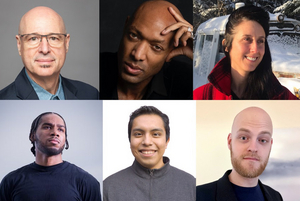The Center at West Park to Present Ensemble Pi's RADICAL KINSHIP
Radical Kinship will be presented live and streamed at The Center at West Park on Wednesday, March 2, 2022 at 7 p.m.

Radical Kinship is Ensemble Pi's new concert project, inspired by the work of global champion of social justice, Father Greg Boyle, and his belief in the power of radical kinship to heal society's inequalities. For Boyle (founder of the LA-based Homeboy Industries, one of the most successful rehabilitation and re-entry programs for gang members in the country), the solution to an unfair criminal justice system begins with the recognition that we belong to each other, and the necessity to give voice to marginalized people. In the spirit of Boyle's radical kinship, Ensemble Pi has commissioned composers Orlando Jacinto García, Gregg Welcher, Ralph Mendoza and rapper AJ Peoples, and vocalist Damian Norfleet and dancer/puppeteer Maura Gahan, to create works addressing systemic poverty and over-criminalization with narratives told by (ex-)incarcerated people and other oppressed populations.
Radical Kinship also includes Olivier Messiaen's Quartet for the End of Time (selected movements), Frederic Rzewski's Attica (Part II), and former incarcerated people, Charles Grosso and Alberto Duque, narrating their own stories live with music accompaniment. The concert will cap with a Q&A featuring Father Greg Boyle and the artists. A socially conscious new-music collective, Ensemble Pi has been commissioning living composers to create works addressing the issue of mass incarceration and the emotional toil it takes on inmates and society at large since 2015, and Black Lives Matter and systemic racism since 2016. The 2022 concert is presented by The Center at West Park (NYC), with support from Katal Center for Equity, Health, and Justice (Hartford, CT) - an organization working on ending mass criminalization, mass incarceration and the war on drugs. Radical Kinship will be presented live and streamed at The Center at West Park on Wednesday, March 2, 2022 at 7 p.m. (with post-performance video available on demand). The Center at West Park is located at 165 W 86th Street, New York NY 10024. Tickets: $20 general/$15 students. A portion of the box office will be given to Katal Center for Equity, Health, and Justice. Register online at centeratwestpark.org/events/ensemble-pi-radical-kinship.PROGRAM
Orlando Jacinto Garcia: impulso/momentum (2022, Premiere)
Baritone voice, clarinet, violin, cello, piano, percussion, and text by Garcia
Clarinet, violin, cello, piano Frederic Rzewski: Attica (Part II) (1972)
Voice, chamber ensemble Gregg Welcher: Set of variations on the prison work song "Early in the Mornin'" (2022, Premiere)
Tape, clarinet, violin, cello, piano, percussion Ralph Mendoza & rapper AJ Peoples: A Different Way (2022, Premiere)
Text from AJ Peoples and Quntos KunQuest's novel, This Life (2021)
Voice (rapper), cello, violin Maura Gahan & Damian Norfleet: Isolated Triptych (2022, Premiere)
An improvised piece for movement, puppetry, and voice Charles Grosso: Resuscitation & Alberto Duque: I Had No Air
Stories by former incarcerated people, narrated live with music improvisation Performers:
Moran Katz, clarinet; Alexis Gerlach, cello; Airi Yoshioka, violin; Victor Caccese, percussion; Idith Korman, piano; Damian Norfleet, voice; AJ Peoples, voice; Eduardo Leandro, conductor; Maura Gahan, dancer/puppeteer; Charles Grosso, narrator; Alberto Duque, narrator; Angel Tueros, guitar
ABOUT THE PROGRAM:
Commissioned by Ensemble Pi, Cuban-American composer Orlando Jacinto Garcia's impulso/momentum is scored for chamber ensemble, with a text in Spanish written by Garcia. Whether whispered, spoken or sung, the text is descriptive of the impacts of social injustices found in the US and abroad, while the title refers to the current social movements attempting to combat these injustices. Playing with counterpoint between register, density, timbre and pacing, the music unfolds slowly, changing the listeners' perception of time and freezing them in the moment.

Videos

